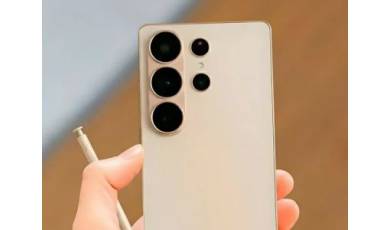Flash firmware on Gigabyte G1305
Mobiles >> GigaByte >> Gigabyte G1305| Specifications | Reviews | Secret codes |
| Unlock phone | Root phone |
| Backup | Flash Firmware | Screenshot |
How to flash Gigabyte G1305?
Why reinstall the firmware?
Errors constantly appear in the Android OS.
Some installed applications stop opening.
Many programs from the Play Market do not work.
The phone turns off for no apparent reason.
The phone started to work slowly.
You are not satisfied with the possibilities of the stock firmware.
Where can I find the firmware?
On the phone manufacturer's website.
On sites where developers post custom or official OS.
What should be done before installing the firmware?
Back up your contacts and user data and transfer it to your computer.
Insert SD card. An SD card is needed to write firmware to it.
Determine your smartphone model.
Fully charge your phone. If the battery runs out during boot, the device will no longer turn on.
Download archive with Firmware. Place it on the SD card.
Installing TWRP Recovery
Download the Official TWRP App to your phone from the Play Market. And install this app.
When you start the application for the first time, you must agree to install the firmware, as well as agree to grant the application Superuser rights and click the 'OK' button.
Going to the next screen, select the item 'TWRP FLASH' and provide the application with root-rights.
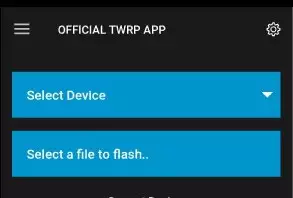
On the main screen of the application, click 'Select Device', and select your phone model.
After selecting a device, the program redirects the user to a web page to download the corresponding image file of the modified recovery environment. Download the suggested *.img file.
After downloading the image file, return to the main screen of the Official TWRP App and press the 'Select a file to flash' button. Select the file downloaded in the previous step.
Press the 'FLASH TO RECOVERY' button and confirm your choice, press 'OK'.
When the message 'Flash Completed Succsessfuly!' appears. Click 'OK'. The TWRP installation procedure is now complete.
Write the firmware to the SD card. Using a PC or laptop card reader.
Insert a SD memory card into the phone.
To reboot into recovery, you need to enter the menu accessible by pressing the button with three stripes in the upper left corner of the main screen of the application. Select 'Reboot' and then click on the 'REBOOT RECOVERY' button.
Firmware via TWRP
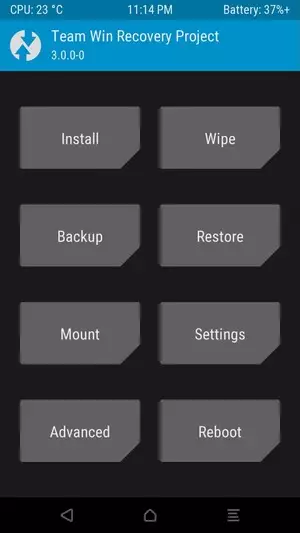
Before flashing, you need to delete all user data from the phone, this will avoid many problems. press 'WIPE' on the home screen.
You can start flashing. Click the 'Install' button.
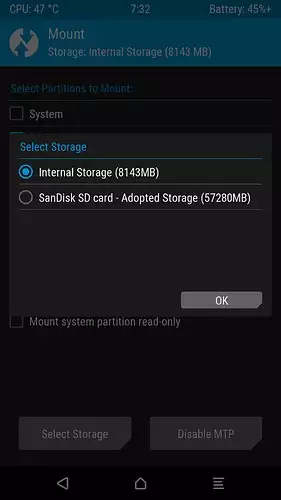
The file selection screen appears. At the very top there is a 'Storage' button for selecting an SD card.
Select the location where the files were copied. Press the 'OK' button.
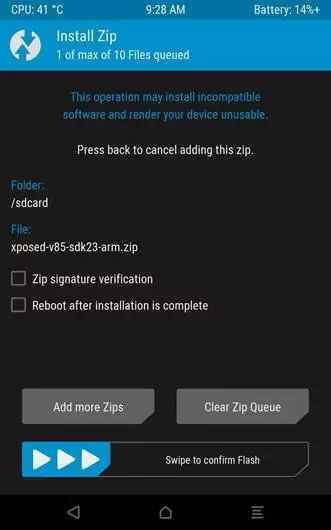
Find the file we need and click on it. A screen opens with a warning about possible negative consequences, you need to check the item 'Zip signature verification', which will avoid using corrupted files when writing to the phone's memory sections.
The procedure for flashing the phone will begin, accompanied by the appearance of inscriptions in the log field and the movement of the progress bar.
After the firmware installation procedure is completed, the 'Successful' message appears on the screen.
Summary: OS: Android (1.6); Dimensions: 5 megapixels; Flash: LED; Camcorder: Yes; System chip: Qualcomm Snapdragon S1 MSM7227; Processor: Single core, 600 MHz; System memory: 256 MB RAM / 512 MB ROM; Storage expansion: microSD, microSDHC up to 16 GB; Talk time: 7.16 hoursthe average is 11 h (675 min); Stand-by time: 17.1 days (410 hours)the average is 20 days (477 h); Talk time (3G): 6.16 hoursthe average is 15 h (902 min); Stand-by time (3G): 25.0 days (600 hours)the average is 23 days (550 h); Capacity: 1230 mAh; Type: Li - Ion; Music player Supported formats: MP3, AAC, AAC+, WAV, M4A (Apple lossless), AMR, 3GP, MIDI; Video playback Supported formats: MPEG4, H.263, H.264; Browser su ...
Comments, questions and answers on the flash firmware Gigabyte G1305
Ask a question about Gigabyte G1305

